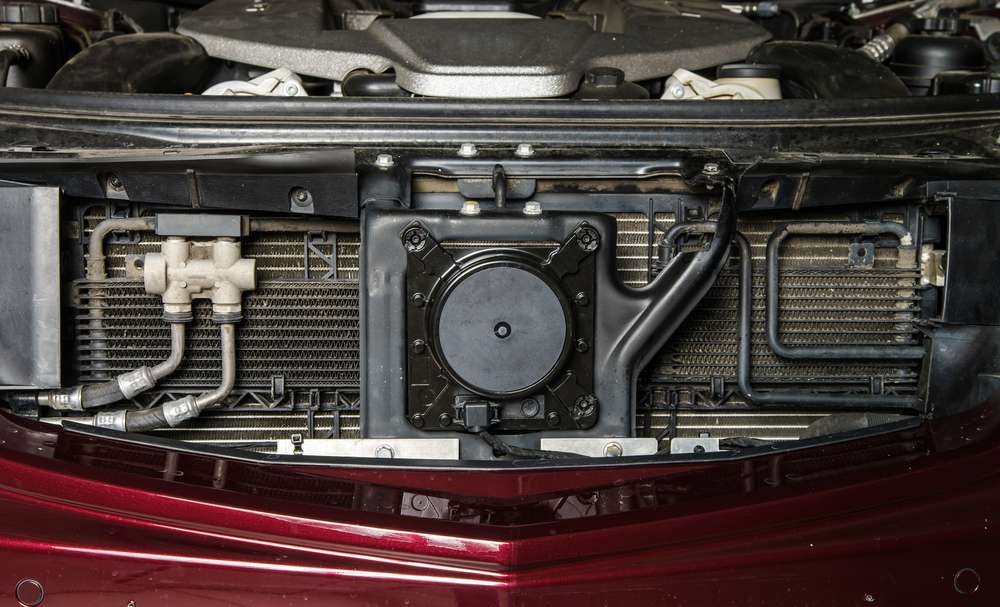Why is a car radiator repair so important? Have you ever seen somebody stuck by the side of the road, smoke billowing out from under the open hood of their car? Maybe you’ve been in this position yourself. Regardless, it’s not a situation anybody wants to find themselves in, especially in the Phoenix heat. Having the radiator repaired at the first sign of trouble will help you prevent frustrating, costly problems.
What’s the Radiators Purpose?
Radiators play an important role in removing heat from a vehicle’s engine, ensuring that it can function properly, without risking a sudden breakdown. While the engine both burns fuel and generates the friction necessary to give your vehicle the juice it needs, it also results in a good deal of heating. That heat buildup must be redirected away from the engine; otherwise, it will cause a lot of damage, in some cases breaking down the engine altogether.
How the Radiator and Cooling System Work Together
Engines have multiple parts, including built-in cooling systems like the exhaust system, by which heat escapes. The oil in the cooling system lubricates applicable engine parts, reducing the level of friction. Even with this protective interaction, engines can get hot and quickly. Once a certain temperature is hit, the rest of the vehicle’s cooling system kicks in. When this happens, the thermostat reacts to the unacceptable temperature, triggering the release of the water and coolant that’s in the radiator. At this point, the water and coolant combination registers the heat produced by the burned fuel and engine friction. Then, it’s transferred back into the radiator. The surface area is sufficient enough to allow the coolant to cool. In addition, there’s a fan located near it that helps cool down the coolant even more. External air drawn in through the vehicle’s vents provides additional cooling power. Once the coolant has cooled down sufficiently, it’s sent back into the engine to pick up the heat again. When this intricate system isn’t working properly, costly damages will occur.
When Do You Need a Car Radiator Repair?
There are several things that can lead to the need for a radiator repair and you can count on expensive repair costs if you ignore or put off having the problems addressed.
Thermostat Issues
When a radiator stops working right, an excessive amount of pressure is put on the thermostat (from which coolant is released into the engine), generally causing it to stop functioning. If the thermostat stops working, the valve inside can get stuck in an open or closed position. A common problem is that if the thermostat ends up clogged with debris from a faulty radiator, it won’t be able to open. This is a serious issue because it means that the engine will overheat and break down if you don’t have it fixed right away.
Heater Core
If the radiator fails, it causes the engine to overheat. The excessive temperatures and pressure can result in breaking the heater core’s connections, often causing leakage. A sign that the heater core is leaking is fog build up on the windows and damp floorboards in the front.
Leaking
Leaks are a common reason for cooling system malfunctions, causing coolant levels to drop; when there’s not enough coolant, heat can’t be handled properly. So, if you notice fluid underneath your parked vehicle that you think is due to a leak, have it inspected and repaired right away.
Water Pump
Rough debris breaking free from the radiator will eventually damage the water pump. In addition, if the radiator isn’t cooling the fluid before it flows past the impeller, the hot temperatures can damage plastic parts. At this point, if the radiator repair is put off, pieces of the impeller (the rotating component of a centrifugal pump designed to transfer fluid by rotation) will break apart and interfere with the flow of the coolant.
Don’t Put it Off
If a vehicle’s radiator goes bad, then it could have an impact on the entire automobile. Because the radiator plays such an important function (keeping the engine cool by removing the excess heat), it’s not a repair you should put off. If an engine is not able to stay cool, then it can lead to other expensive problems including transmission failure.
For Phoenix residents, regular maintenance is imperative. Small issues don’t have to turn into huge financial crises, contact us today.





